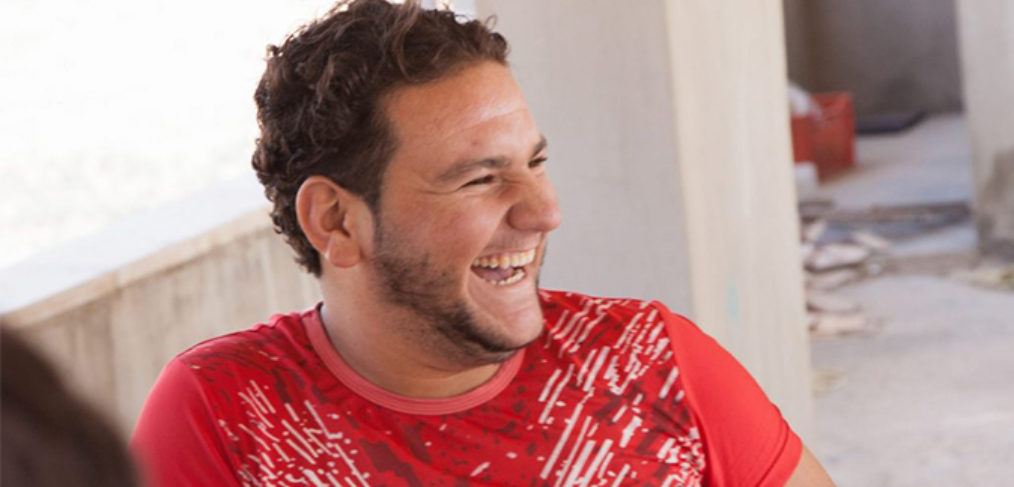Recently I was jolted out of my everday cynicism at the current situation in the world today by a surprising and touching conversation with 2 young men living with their families in the most difficult of circumstances. Their home is in the huge, troubled and impersonal Zaatari refugee camp in Jordan. They had fled there a few years ago with their families from their Syrian homeland. Their positive, warm and mature approach despite the hardships of their lives was heart warming and impressive. Surprisingly they attributed their current cheerlful and positive outlook to having been taught breathing and meditation techniques there on the largely EU funded Peacebuilding programme of a UK registered charity offering trainings in empowerment, resilience and stress management to thousands of troubled and traumatised young Syrians, as well as their host communities in the refugee camps of Lebanon and Jordan. The programme is funded by the EU.
Through my work, I was lucky enough to be talking to and working with the Peacebuilding unit of IAHV, a non-profit, United Nations- Affiliated organisation who are helping refugees, young children and students in Jordan and Lebanon to empower their own lives. The International Association for Human Values (IAHV) Peacebuilding Unit is a remarkable organisation whose goal is to build sustainable peace by promoting the development of human values in individuals and societies globally, teaching the importance of working together to become effective peace builders in their own communities.
The IAHV run many programmes all centred around the clear goal of peace building and bringing people closer together in what are undoubtedly unpredictable, scary and incredibly difficult times. The programme that I have been focusing on, with the help of these incredible young people, is the Youth Anti-Violence and Ambassadors for Peace Programme, a programme aimed at mobilising youth for peace by addressing the symptoms of war and conflict through a holistic approach which includes special breathing and relaxation techniques, teambuildling games, powerful processes, and peace building modules. I have been working closely with Christian Matta, a trainer in the field who works with the refugees and young people, teaching them these unique breathing exercises as a way of dealing with the stress, fear and traumas that you’d expect from a war-torn area of conflict. IAHV works on all sides of conflict, with rebels, militants, gangs and prisoners to break the cycle of violence and support nonviolence to reach their goals. They work with people and communities affected by violence and war to provide trauma-relief, resilience and empowerment. A special focus is young people who want to become leaders for peace in their communities and schools; in order to prevent violence and radicalisation and to strengthen the mindsets, attitudes and wellbeing of individuals and communities for peace.
It’s helping my relationships and changing my life. – ASSEM
As you can tell, it’s an incredible organisation and it’s a fascinating concept to get your head around isn’t it? I have to admit when I was researching the programme and first talking to Christian I was slightly sceptical. Don’t get me wrong, as someone who has undergone CBT therapy and meditates two-three times a week, I completely understand the benefits of learning to control your breathing, but, I was eager to find out more to see whether this practice could really transform the lives of those living in such terrifying times and in such a fragile and fractured part of the World.
The two students that Christian introduced me to were Assem and Mohammed. Both are 18 and both are from Daraa Syria. Assem has been living with his four siblings at the Zaatari Refugee Camp in Jordan for 5 years after escaping his war-torn village through the Jordanian borders in 2013. After struggling through many hardships to reach the camp, Assem realised the camp itself had its own challenges and so he took the responsibility to search for educational workshops where he could learn and help build a community for future generations. Mohammed was 12 when he reached the camp and was with his mother and three younger siblings. His father stayed behind in Syria. At the start of his time at the camp, Mohammed took on the incredible responsibility of looking after the whole family, helping them adjust to the new and different lifestyle of the camp and trying to help them all forget the past and move forward to the future until his Father joined them in Jordan. Once the family were reunited, Mohammed was able to concentrate on his studies and education in a bid to not only look after himself and his family but also the community by volunteering in the Road Safety Committee and Syrian Youth Committee.
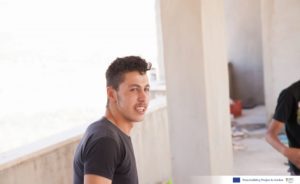
Finding out and discovering their stories was a huge eye opener for me. It was inspirational to understand just how much these boys have already had to deal with in their lives and what they’re doing towards their futures. Both are 18, which means they have spent all of their most formative and important years in Zaatari Camp and they’re both currently studying hard in their final few months in high school.
As is quite often the case when I meet new people, the conversation immediately headed towards football. Assem supports Real Madrid and yep, you guessed it, his favourite player is Cristiano Ronaldo. After a brief chat about football, video games and their studies, I wanted to find out if they were able to describe the feelings and sensations that the fair of them get when practising the techniques. “I feel relaxed” said Assem. “Definitely relaxed and I feel that all the stress is gone after I finish my breathing. Sometimes when I’m very upset, I want to hit something, break something. I do my breathing, and I calm down. I also feel a lot of comfort on a physical level”.”Do you feel better immediately?” “Not immediately, but after half an hour to an hour I start to feel better”. Mohammed agreed, “I feel relaxed and I worry less”.
I asked how these techniques helped their day-to-day lives. Speaking from my own experience, whenever I meditate I feel completely calm, relaxed and level headed and wanted to know whether the unique breathing techniques gave the boys a similar sensation. Mohammed explained “The techniques help me to focus. I am very hot-headed usually, but once I do my breathing I don’t react. I accept other people’s opinions and I connect with them. The breathing techniques help me to give advice and I love to help find the answers to problems”. “You mention your hot-headedness, when was the last time you really lost your temper and have these techniques helped you keep your aggression under control?” “The last time I lost my temper was with a teacher! He wasn’t respecting me, disrespecting me and had I not done my breathing exercises in the morning, I would have answered back. Maybe even hit him back”. Assem added the exercises have affected his day-to-day life by helping him to study. “I do them every morning when I wake up as it helps me study better and also at the end of the day. I do them twice a day, in the morning and in the evening”. “Do you feel that gives you a more clear-headed approach for during the day?” “Yes, definitely.”
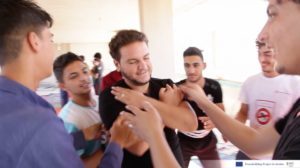
Aside from the benefits the programme was having on their schooling, I was intrigued to know whether the programme was helping them become a better person and to see if the programme had changed their lives. “Yes, sure” Mohammed said. “Instead of being someone who is angry and sad, I can be calm and relaxed and composed instead of being isolated and on my own with my thoughts and negative emotions. Mentally, I feel really, really relaxed. The programme has changed my life in multiple ways with my friends and family. My friends especially. I stopped drinking and smoke shisha…” “Really?!” asked Christian as the room enjoyed a joke. “Well, once a week now! I used to smoke four times a day and now I did it once a week”. Assem also agreed, “Definitely (helping me become a better person). It’s helping me in terms of communication between my family and friends. It’s helping my relationships and changing my life. Since I came from Syria I became more angry and violent and stressed but now I can control my emotions”.
“I want to be an engineer, but more than that I want to help people. – MOHAMMED”
As incredible as it was to hear how the programme had changed these boys own and countless other lives, I also had one final question that I was desperate to ask. The programme is geared towards helping to fight extremism and helping prevent the recruitment of young people so I had to know what Mohammed and Assem would say to people who are being lured into radicalisation. Mohammed, who has made so many changes in his life since starting programme said “I would say to them that we are all one. I would also teach them the yoga and breathing exercises that we have learnt”. Assem added “We are peace ambassadors, we are giving advice on how to not to go on the wrong side. We try to bring more awareness to extremism, to show people the danger of radicalisation. The programme will teach people to avoid and to be more conscious of conflict”.
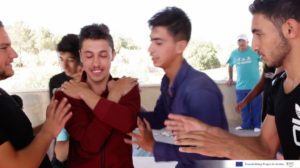
It was fascinating to spend some time talking to these incredible young men whose lives would appear to be worlds apart from ours, but the reality is they aren’t. They are eloquent, funny and hard working individuals with plans and ambitions for the future. Assem wants to finish High School, study computer engineering at University and then hopefully study abroad, something that his involvement with the programme has helped with. Mohammed however told me of his plans and honestly, I wasn’t expecting his answer to be so touching and beautiful. “I want to be an engineer, but more than that I want to help people. When I go back to Syria, I want to be a pillar in the community, I want to rebuild my country. After rebuilding Syria, I want to visit and meet people all over the world”. As goals and ambitions in life go, I can’t think of many better than that.
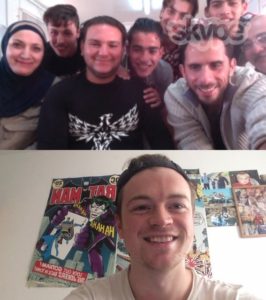
SOURCE COURTESY : www.vergemagazine.co.uk

